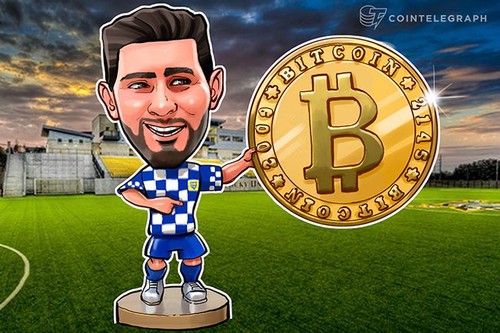
Author: @benblockchain General Partner
Over the coming weeks we will be looking at tokenized use cases within the sports ecosystem. In part one of our four part series we look at how tokenization will affect football (soccer) clubs and the potential use cases.
Football is the most popular sport in the world so naturally this opens up massive opportunities for tokenization and use of blockchain technology. We are already starting to see a number of clubs partnering with blockchain companies, such as the recent partnership between Cashbet Coin and Arsenal (Read More), or Leicester City’s deal with FansUnite (Read More) and eToro’s deal with 7 Premier League clubs, Tottenham Hotspur, Newcastle United, Leicester City, Crystal Palace, Southampton, Cardiff City and Brighton & Hove Albion (Read More). As well as clubs making key partnerships we will also start to see them exploit the many other benefits of an already $40Bn+ industry.
Football, blockchain and cryptocurrency already have an interesting partnership that will only continue to grow over the coming years. Since the corporatization and commercialization of football over the past 30-years, the financial gains from the game have been enormous. It only makes sense that this will forge alliances moving forward into a brave new economic landscape, and it’s already apparent that the allegiance is a match made in football heaven.
Consideration of a “Football” Token issued either by each club in a league or the league association itself will provide many additional benefits for both clubs and fans alike bringing them together with a common interest in the business of the sport, while improving of a number of inefficiencies and inter-related components that currently exist. Tokenization will provide clubs with a new financing model, which involves token-design and issuance services.
So, lets take a look at how Tokenization could work and the benefits.
“FOOTBALL” TOKEN USES
Branding & Loyalty
All top level clubs now have fan bases spread far and wide across the globe but they struggle to connect properly and harness the potential revenue streams from all their fans. For example, Real Madrid have a global fan base of approximately 450M but only around 1% of them will ever pass through the Santiago Bernabéu Stadium to watch their team live. So what about the other 445.5M fans? This is a massive untapped revenue that far exceeds any current revenue streams, such as TV rights etc.
Football has become an expensive pastime supporting your team with tickets, travel, merchandise and concessions etc. costing each fan thousands of dollars per year. Disrupting the current third-party infrastructure that many clubs use today as a marketplace for tickets and merchandise can provide full transparency of a ledger, while the decentralized nature of a Token provides the emergence of a revolutionary financial ecosystem allowing clubs to pass some of the savings directly onto their fans.
Tokenization naturally increases brand and loyalty. How? Lets look at how a Token could be used to align the incentives of clubs, fans, and players while revolutionizing the football industry.
- Ticketing
Watching your team play, week in week out, home and away, can be a costly experience. Many clubs still use antiquated ticketing technology from legacy operators typically paying fees ranging from 5% to 8% in commission based on the notional value of tickets sold. Tokenization can reduce the third-party payment processing costs, fraud and risk, these savings can directly go back into the ecosystem for fans, businesses and other programs such as youth development.
Clubs could offer cheaper tickets and track fan behavior offering relevant promotions with each fan having their own digital wallet holding Tokens used to purchase season or matchday tickets. Verification of tickets on a ledger would allow fans to buy genuine tickets from third-party vendors eradicating forged tickets sold by ticket touts while reducing clubs processing fees to zero providing a win-win scenario.
2. Merchandise
Buying the latest shirt or other merchandise can be extremely costly with football shirts alone costing anywhere from $100 to $150 per season. Transaction fees from processing merchants can range from 2% - 4% and fake, cheaper copies flood the market with clubs loosing millions of dollars globally on an annual basis.
Purchasing merchandise using a Token enables fans to easily purchase original merchandise, access exclusive services and other packages and purchase with a Token - from anywhere in the world. Again clubs can track globally through a ledger who has purchased what merchandise where, while reducing processing fees to zero.
Additionally autographed merchandise can be recorded, authenticated and verified on a ledger giving both fans and clubs more control and transparency. Player cards, stickers, digital historical shirt ownership and other digital collectibles can be offered by the club increasing revenues and engaging fans while increasing brand value.
3. Concessions
Ok, you have the ticket and have bought the shirt but it doesn’t end there. Once inside the stadium food and drink can soon add up! Transaction fees from processing merchants range from 2% to 4% while Tokenization reduces these processing fees to zero.
Building in an additional rewards system to the Token can increase revenues and reduce overall costs for the fans while the club can use targeted promotions tailored to specific third-party vendors providing better value to its partners.
4. Betting
Sports betting is well established in the UK and Europe, however, it was only legalized in the United States in May of this year (Read More). Utilizing a blockchain betting platform provides a more cost effective service for fans allowing clubs to negotiate with these betting providers a share of the profits and use of their Token within the platform. Previously untapped bettors in the US will now be able to place bets on their favorite teams bringing billions of dollars of additional revenue into the ecosystem.
5. Player Transfers
Yes, it has already happened in case you missed it! Amateur Turkish club Harunustaspor paid 0.0524 in Bitcoin (approximately £385) and 2,500 Turkish Lira (£470) as part of the deal to sign 22-year-old Omar Faruk Kirogl in January (Read More),

Meanwhile Rimini FC, a team in lower tiers of Italian football, became the first club to be purchased using cryptocurrency (Read More).
Currently clubs pay a minimum of 2% to 3% in fees when transferring money across borders for player transfers. In the UK, Brexit will heavily impact clubs purchasing power. Blockchain technology and Tokenization has the potential to make this process more efficient. Exploring Token use as a currency that facilitates player transfer fees between clubs can increase transparency and reduce costs. We could go as far as suggesting players salaries my even be paid in digital currency sometime in the future.
6. Streaming
For many fans it is impossible to get to watch their team live in a stadium due to spiraling costs, location and availability. This leaves many with little choice but to pay for expensive cable packages or one off pay per view games. Most clubs operate their own TV channels however these are not monetized to their full potential. Tokenization allows for better interaction, premium content, and rewards linked to ticketing and merchandise. Fans now want to consume content in a different way with match highlights and player interviews becoming more popular. The ability to connect anywhere “on the go” and watch your team is appealing to many fans.
7. Fan Engagement
A Token allows a “fan-driven” football community the opportunity to take part in various club and fan experiences from matchday tickets, tours and player meet and greets (VIP experiences) to specific merchandise and third-party partner offers. The goal is to create the “ultimate sports community” for fans. Converting existing fans and attracting new ones while monetizing the technology or service stemming from it is key.
A matchday experience is no longer just about the game, it encompasses a whole lot more.
Maintaining and growing a fan base means clubs now need to offer fans who are not in the stadium a similar experience to those who are. Currently they are missing many opportunities due to a lack of tech implementation and innovation creating a big disconnect. Betting, fantasy sports, gaming, promotions and give aways are just a few ways of utilizing a Token to engage a broader and bigger fan base.
Furthermore the clubs stadiums will emerge into “Smart Venues” facilitating increased revenues within participating venues and also the surrounding business community.
8. Club (Equity) Ownership
There are billions of football fans who are a young demographic, keen to invest in their favorite teams and players. Tokenization can give them the opportunity to partake in club financing packages and be directly rewarded or take equity ownership at a lower cost.
In terms of Club (Equity) Ownership, Tokenization allows clubs of all sizes to raise capital via equity sales and also offer contributors a wealth of fan experiences and social interaction. For the club it brings cost savings, economies of scale and higher security to capital programs and for a smaller club the opportunity to significantly increase their fan base and compete financially in the marketplace.
Clubs can benefit from brand association and the fact that global exposure encourages fans from farther afield to build a portfolio of clubs in the same way we currently buy stocks. Tokenization enables an injection of fresh “cheaper” capital to create added-value boosting clubs financing, helping improve fan engagement and promoting social good, youth development and gender equality. Global fan ownership can allow any fan can buy, trade or sell their Tokens of choice.
9. Sponsorship
Sponsorship has always been a big revenue stream for clubs. This can include anything from shirts, billboards, training facilities, to the stadium itself. Premier League club, Wolverhampton Wanderers and CoinDeal signed a shirt sleeve sponsorship deal this season (Read More). Tokenization will allow clubs to negotiate better, more profitable sponsorship deals in the future. Clubs my also want to tokenize their actual playing squad increasing revenues generated from the rights they have to those players.
SUMMARY
In summary Tokenization brings security, transparency, and lower operating costs. The partnership between football, blockchain and cryptocurrency is just beginning. The potential ventures really are endless and cover many aspects of the game which we have touched on, from finance and sponsorship, to grass-roots coaching, technical innovations and beyond.
Don’t forget to look out for part 2/4 of Sports Tokenization Use Cases which will be looking at Professional Athletes. Follow us here on Scorum and don’t forget to upvote our articles!
NOTE: This article should not be considered financial or legal advice and is the opinion of the author.
For more information on the SportVEST Private-Sale, contact us at: hello@sportvest.io or visit our website at: sportvest.io. Don’t forget to join us on Telegram and follow us on Twitter.
Comments